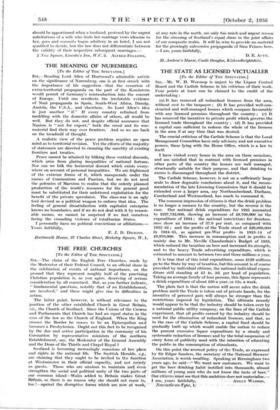THE STATE AS LICENSED VICTUALLER
[To the Editor of THE SPECTATOR.]
SIR,--Mr. W.: H. Worsnop is unjust to the Liquor Control Board and the. Carlisle Scheme, in his criticism of their work. Four points at least can be claimed to the credit of the undertaking :
(a) It has removed all redundant licences from the area, without cost to the taxpayer ; (b) It has provided well-con- structed and well-managed houses which compare favourably with any licensed premises throughout the country ; (c) It has removed the incentive to private profit which governs, the licensed trade throughout the country ; (d). It has provided a capital sum sufficient to redeem the whole of the licences in the area if at any time that was desired.
The crucial criticism of the Carlisle Scheme is that the Local Management Committee have only advisory and not executive powers, these lying with the Home Office, which is a law to itself.
I have visited every house in the area on three occasions, and am satisfied that in contrast with licensed premises in other parts of the country the houses are well managed, structurally suitable for their purpose, and that drinking to excess is discouraged throughout the district.
The Carlisle Scheme, however, is not on a sufficiently' large scale to draw dogmatic conclusions about it, and the recom- mendation of the late Licensing Commission that it should be extended over a larger area, say Northumberland, Durham, Cumberland and Westmorland, has much to commend it.
The common impression of citizens is that the drink problem is no longer a' menace to the country, but the' reverse is the case. Our national drink expeitditnre for 1935 'amounted to £237,732,000, showing an increase of 28;700,000-.On the expenditure of 1934 ; the national convictions' foi `drunken- ness show an increase of '37.9 per cent. as cointiare&ibitlx 1932-33 ; and the profits of the 'Trade stand at 223,0130,000 in 1934-35, as against pre-War profits in 1913-14 of £9,970,000. This increase in .consumption, and in' profits is mainly due to Mr. Neville Chamberlain's Budget of 1933, which reduced the taxation on beer and increased ita:strength, and to the heavy Trade advertising expenditure, which is estimated to amount to between two and three millions a year.
It is true that of this total expenditure, some £128 millions
go to the State by way of taxation, but this amount is of course provided by individual citizens, the national individual expen- diture still standing at £5 4s. Sd. per head of population. Taking an average family of four persons,-this figure represents a -drink expenditure of about £30 a year, or 12s. a week.
The plain fact is that the nation will never solve the drink problem until the Trade is taken out of private hands, for the incentive of personal gain will always be stronger than the restrictions" imposed by legislation. The ultimate remedy would appear to be that the industry should be taken over by a national public utility company, on the lines of the Carlisle experiment, that all profits earned by the industry should be used for the elimination of redundant licences,. and that, as in the case of the Carlisle Scheme, a capital fund should be gradually built up which would enable the nation to reduce the present excessive liquor expenditure by a -steady and systematic reduction of lieences and by thetotal-suspension of every form of publicity used with the intention of educating the public 'in the consumption of stimulants.
On this point the a•voived policy of the. Trade, as expressed
by Sir Edgar Sanders, the secretary of the-National 'Brewers' Association, is worth recalling. Speaking at Birmingham two years ago, he said-4- We want new customers. We want to get the beer 'drinking habit' instilled• into thousands; -almost millions- of -young men' who do -not know the taste of beer." OM- citizens -mint see that this ambition-does not materialise.—










































 Previous page
Previous page